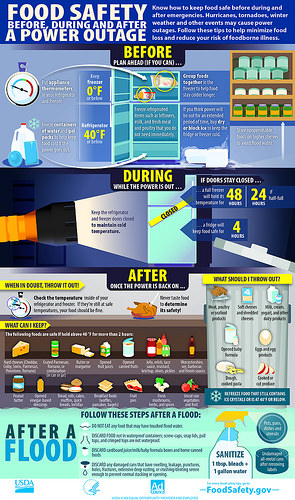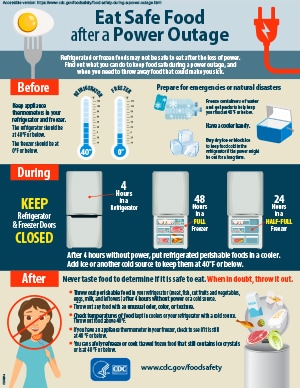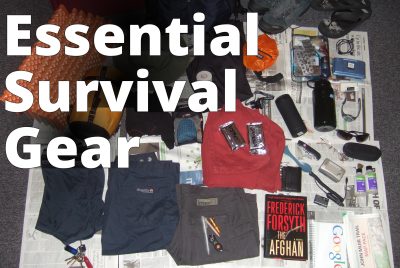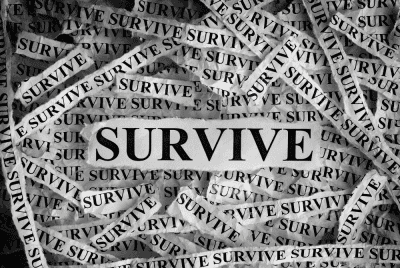Preventing Food Spoilage During Extended Power Outages
Preventing Food Spoilage During Extended Power Outages Tips
Experiencing an extended power outage can often lead to frustration and worry, especially when it comes to the preservation of food.
In “Preventing Food Spoilage During Extended Power Outages”, we provide you with a comprehensive guide that explains the different methods you can implement to keep your food fresh for longer durations.
From practical storage tips, understanding the science of food spoilage to emergency preservation techniques, this article covers everything you need to know to safeguard your groceries and cooked meals against common spoilage culprits during those unforeseeable power outages.

This image is property of www.usda.gov.
Understanding Why Power Outages Cause Food Spoilage
An unexpected power outage can be a nuisance at best and hazardous at worst.
One of the biggest concerns is the spoilage of our stored food.
To grasp why power outages cause foods to deteriorate, we must first understand the role refrigeration plays in food preservation.
Role of Refrigerator in Food Preservation
Our refrigerators and freezers serve a vital and often overlooked role in our homes. They keep our food at safe, low temperatures, slowing down the growth of harmful bacteria and extending the shelf-life of our perishables.
Consistent, low temperatures preserve the freshness of our food, reducing spoilage and wastage, and ensuring the safety of our meals.
How Extended Power Outages Can Lead to Food Spoilage
During power outages, our refrigerators and freezers cease to function, causing the temperature inside to rise rapidly.
Any perishable food – milk, meat, cooked dishes, just for example – starts to spoil once the temperature rises beyond safe levels, generally around 40°F.
In an extended power outage, we can lose not just meals, but an entire provision of stored food.
Identifying Types of Foods That Spoil Fastest
Different foods spoil at different rates. Perishables, like poultry, seafood, dairy, and eggs, spoil quickly without refrigeration.
Fruits and vegetables can last a bit longer if kept in a cool, dry place, but they are not immune to spoilage.
Understanding which foods are most likely to spoil helps us prioritize consumption and storage during a power outage.
Preparing in Advance for a Power Outage
Forewarned is forearmed. Planning ahead for power outages ensures we don’t lose our cool when they occur. Let’s look at some key steps we can take:
Assembling an Emergency Kit for Food Storage
Our emergency kit should include items that keep food cool: coolers, ice packs or frozen gel packs, and a thermometer to monitor temperatures.
We should also include basic utensils, a manual can opener, and if possible, a portable stove for cooking.
Maintaining an Optimal Fridge and Freezer Temperature
The ideal temperature for a fridge is 40°F or below, and for a freezer, it’s 0°F or below. Regularly check and adjust your refrigerator’s settings to ensure these temperatures are maintained.
This will help keep food at a safe temperature for a longer period during a power outage.
Stocking up on Non-perishable Food Items
Non-perishable food items – canned goods, dried fruits, nuts, and grains – can become lifesavers during extended power outages. These food items do not require refrigeration and can provide essential nutrition.
Purchasing a Generator for Extended Outages
If power outages are frequent or extended in your area, then investing in a generator could be a wise decision. A generator can power your refrigerator and freezer, keeping your food safe for a longer period.
Proper Food Storage During a Power Outage
If a power outage occurs, strategic food storage can help preserve your food for as long as possible.
Utilizing Coolers and Ice Packs
Store perishables in coolers with ice or frozen gel packs. Ensure the cooler remains closed as much as possible to keep the temperature low.
Grouping Food Together in the Fridge or Freezer
Grouping food together helps maintain lower temperatures. Consider moving items from the fridge to the freezer if you expect a long power outage.
Converting a Freezer into a Fridge During Power Outages
If your freezer is not full, you can use it as a temporary fridge by adjusting the temperature settings. The fuller your freezer or fridge, the longer they will maintain lower temperatures.
Vacuum Sealing and Food Canning
These methods can help preserve food longer without refrigeration. Vacuum sealing removes air, which slows down bacterial growth, while canning uses heat to kill bacteria and vacuum seals the cans.
Using Raw Materials Like Salt, Vinegar for Preservation
Curing with salt or preserving with vinegar are age-old techniques that can help keep certain food items safe during a power outage.
Implementing Food Rotation Policies
Adopting certain practices can ensure you consume your food before it spoils, reducing waste and ensuring you have safe food to eat during a power outage.
Understanding the Significance of Date Labeling
Labeling food with dates helps you track how long they’ve been in storage and when they should be consumed. This can be especially critical when dealing with perishable food items.
Regularly Rotating Your Perishable Food Items
Follow the “first in, first out” approach. Plan your meals around what you already have, prioritizing the oldest items. This ensures food is eaten before it can spoil.

This image is property of www.sdgenews.com.
Prioritizing Food Consumption
During a power outage, it’s just as important to prioritize what you eat, as how you store it.
Consuming Perishable Items First
Foods that spoil quickly should be consumed first. If power remains out, meals can be made from non-perishable items and any properly pre-packed or canned food.
Being Mindful of Food Safety Rules While Consuming
Ensure your food hasn’t spoiled before consuming. Don’t forget hand hygiene; dirty hands can quickly spread bacteria to your food.
Understanding the Risks of Consuming Spoiled Food
Knowing the risks of consuming spoiled food is important to our health.
Recognizing the Signs of Food Spoilage
The signs of spoilage include unusual colors, smells, and textures. If in doubt, it’s best to err on the side of caution: when in doubt, throw it out!
The Health Risks Associated with Consuming Spoiled Food
Consuming spoiled food can lead to foodborne illnesses, causing symptoms like nausea, vomiting, diarrhea, and even severe dehydration. Some bacteria can be life-threatening, making it vital to avoid consuming spoiled food.

This image is property of www.cdc.gov.
Alternative Cooking Methods During Power Outages
If a power outage extends beyond a few hours, we may need alternative ways to prepare our meals.
Grilling or Using a Camp Stove
A charcoal or propane grill is a great way to cook food during a power outage. If that’s not available, a camp stove can be a handy alternative.
Using Patio Heaters
We can convert patio heaters into cooking stations. Just remember, they weren’t designed for this purpose, so exercise caution.
The Importance of Proper Ventilation When Using Alternative Cooking Methods
It is crucial to ensure adequate ventilation when using grills or stoves to prevent carbon monoxide poisoning. Outdoor cooking is safest, but if you must cook indoors, keep a window or door open for ventilation.
Hygienic Practices to Prevent Food Spoilage
Keeping things clean can also help mitigate food spoilage.
Ensuring Hand Hygiene Before Handling Food
Wash hands thoroughly before handling food. It prevents the transfer of bacteria, viruses, and molds that can cause food spoilage.
Proper Sanitization of Appliances Like Coolers
It’s vital to ensure coolers and other appliances are cleaned properly before storing food in them. These appliances can harbor bacteria and molds, which can contaminate your food.
Maintaining Overall Cleanliness During a Power Outage
Keeping the kitchen and cooking utensils clean will also go a long way in preventing food spoilage.

This image is property of npr.brightspotcdn.com.
Preserving Drinking Water Supplies
Keeping drinking water safe is just as important as preserving food during a power outage.
Keeping Water in Safe Containers
Store drinking water in clean and sanitized containers with tight-fitting lids. Avoid containers that have previously held harmful chemicals.
Understanding the Risks of Contaminated Drinking Water
Contaminated water can lead to a host of health problems such as stomach upsets, diarrhea, and serious diseases like cholera.
Methods to Purify Water During Power Outages
Boiling water is the easiest method of purification. If that’s not an option, you can use purification tablets or portable filtration systems.
Recovery Steps Post Power Outages
Once power is restored, there’re a few steps we should take to get back to normal.
Evaluation of Food Safety
Check the food in your fridge and freezer. If any perishable food has been at 40°F or above for two hours or more, discard it.
Discarding Spoiled Food Items Properly
Put spoiled food in a sealed bag before throwing it in the trash. This prevents animals from eating potentially contaminated food.
Returning to Normal Food Storage Routines
Once everything is back to normal, restock your fridge and freezer, first taking stock of what you currently have and what you need.
Identifying any Lessons Learned for Future Outages
Reflect on what’s happened and identify any lessons.
Consider what worked well, what you struggled with, and what changes you might need to make for future power outages.
This image is property of i.insider.com.




